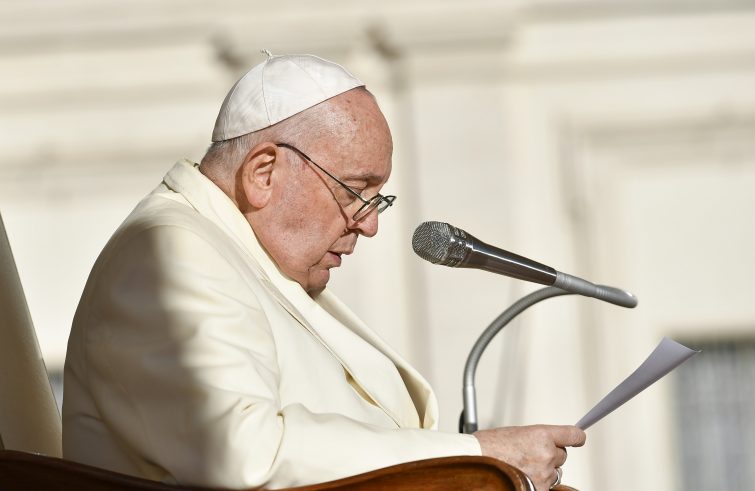
In his greeting to the Italian-speaking faithful at the end of Wednesday’s general audience, Pope Francis exhorted believers to “persevere in prayer for those who are suffering from wars in so many parts of the world, especially for the dear people of the martyred Ukraine, Israel and Palestine.” “This morning I received two delegations, one of Israelis with relatives held hostage in Gaza and another of Palestinians with relatives imprisoned in Israel,” the Pope told the faithful, referring to the events that preceded Wednesday’s audience. “They are suffering so much,” he continued: “I could feel the deep suffering of both.”
“That is what wars do. But here we have gone beyond wars. This is not war. This is terrorism,” Francis denounced.
“Please, let’s continue to work for peace, please continue to pray for peace,” he asked the faithful: “May the Lord lay His hand there, may the Lord help us to resolve the problems and not pursue the passions that will ultimately cause everyone’s death. Let us pray for the Palestinian people, let us pray for the Israeli people, that there may be peace.”
“The Christian proclamation is joy for all,” and Christians are not “privileged”,
the Pope said at the beginning of the catechesis in Saint Peter’s Square, devoted to this theme. “When we truly meet the Lord Jesus, the wonder of this encounter pervades our life and demands to be taken beyond us”, Francis explained: “He desires this, that His Gospel is for everyone. Indeed, in it there is a ‘humanizing power’, a fulfilment of life that is destined for every man and woman, because Christ was born, died, and rose again for everyone. For everyone: no-one excluded.” He then went on to quote from Evangelii gaudium, which marks 10 years since its publication: “Everyone has ‘a right to receive the Gospel. Christians have the duty to proclaim the Gospel without excluding anyone. Instead of seeming to impose new obligations, they should appear as people who wish to share their joy, who point to a horizon of beauty and who invite others to a delicious banquet. It is not by proselytizing that the Church grows, but ‘by attraction’.” “Let us feel that we are at the service of the universal destination of the Gospel, it is for everyone; and let us distinguish ourselves for our capacity to come out of ourselves”, the Pope’s invitation. “A proclamation, in order to be true”, the Pope said, “must leave behind one’s own selfishness – and let us also have the capacity to cross all borders.
“Christians meet on the parvis more than in the sacristy, and go “to the streets and lanes of the city”,
Francis remarked: “They must be open and expansive, Christians must be ‘extrovert’, and this character of theirs comes from Jesus, who make his presence in the world a continuous journey, aimed at reaching out to everyone, even learning from some of his encounters.” To this regard, the Pope mentioned the passage from the Gospel that narrates “Jesus’ surprising encounter” with a foreign woman, a Canaanite who begs him to cure her sick daughter. “The encounter with this woman has something unique about it”, the Pope explained. “Not only does someone make Jesus change his mind, and a woman, foreign and a pagan, but the Lord himself finds confirmation that his preaching should not be limited to the people to whom he belongs, but open to all.”
“We cannot say that we are privileged compared to others – no. The calling is for a service. And God chooses one in order to love everyone, to reach everyone”, the Pope added in unscripted remarks, along with the exhortation to “prevent the temptation of identifying Christianity with a culture, with an ethnicity, with a system. It is not a little group of first-class, chosen people. Let us not forget: God chooses some to love all. This horizon of universality.
The Gospel is not only for me, it is for everyone;
let us not forget this.” “The Bible shows us that when God calls a person and makes a pact with some of them, the criterion is always this: elect someone to reach others”, Francis pointed out: this is the criterion of God, of God’s calling. All the Lord’s friends have experienced the beauty, but also the responsibility and the burden of being ‘chosen’ by him. And everyone has felt discouragement in the face of their own weaknesses or the loss of their certainties. But perhaps the greatest temptation is that of considering the calling received as a privilege: please, no,
the calling is not a privilege, ever!”












